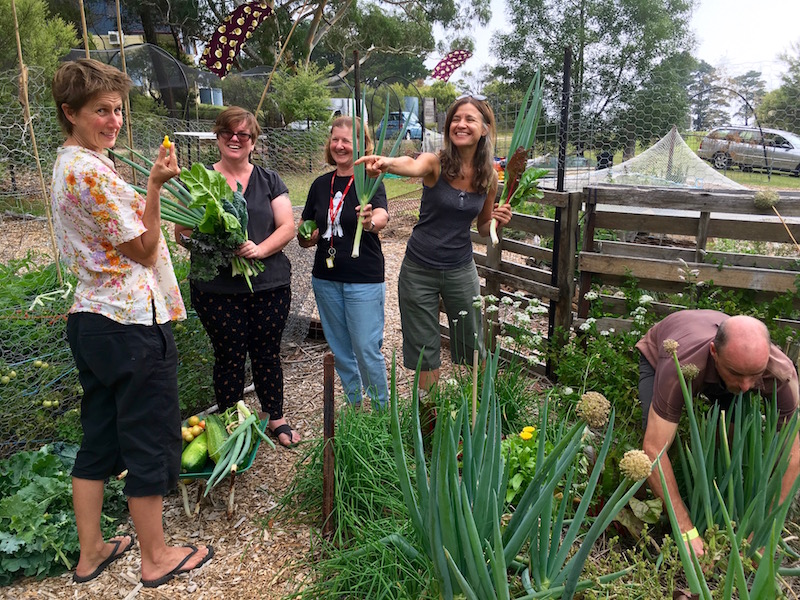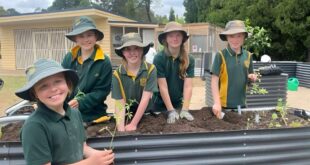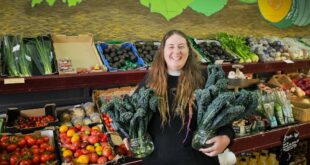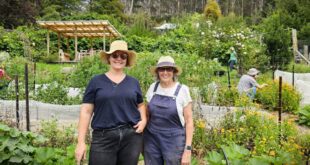Once upon a time (or so the story goes …) Australians collected water in water tanks; grew their own food; sat on their front verandahs waving at passers-by; connected regularly in their neighbourhoods to share skills, resources and produce; got what they couldn’t grow at their corner store; and told themselves that they and their mates were strong and resilient. Then, over a generation, the story changed …
Now, from Lithgow through to the Hawkesbury, community groups, businesses, educational institutions and a range of other organisations, are again bringing people together to learn to grow food, grow relationships and grow resilience. This ‘growing’ movement has emerged from a number of concerns.
One impetus for growing food locally is to lower the cost of living and to provide food security in the event of rising prices or emergencies. Growing food locally also means that plants, and the seeds collected from them, adapt to our environment as the climate changes, and become hardier over time.
Most school or community gardens operate on organic or permaculture growing principles. Knowing your food has been grown organically and being able to pick it and eat it on the same day is considerably healthier than buying food from
supermarkets. The mounting concern about the waste created by our society is another motivation. Being able to pick only what you need reduces food waste and the need for packaging that is inevitable when food is transported long distances. As a response to climate change, growing your own food means fewer ‘food miles’ and therefore lower carbon emissions to get food to our plates. As an added bonus, gardening together helps alleviate social isolation.
Speaking to most of the gardeners volunteering their time in community gardens, it is clear that the main impetus for becoming a ‘community gardener’ is connecting with others and enjoying the company of like-minded people in a beautiful outdoor setting. As one gardener put it: “Every week I know I’ll have at least one day off the computer in which I’ll be spending time outdoors with people I love, getting exercise and then taking home beautiful fresh food for dinner. What’s not to love!”
For those experiencing financial stress, having access to ‘free food’ can also make a profound difference to health and wellbeing.

Lithgow TAFE Garden
When Kim Roach, a teacher in the Foundations Skills Faculty at Lithgow TAFE, began a Garden Club three and a half years ago, it became a means of giving a group of disengaged students ownership of something – an experience many of them had not had before. The garden gave them a sense of pride, fostered teamwork and showed them how to create something from nothing.
Engaging in hands-on activities triggered conversations and gave the students another space outside the classroom. Kim’s main goal was to give them food-growing skills to help them become healthier and more self-sufficient.
Her eyes light up when she talks about how the experience also gave them more confidence, focus, and self-esteem.
She spoke of parents who only ate every second day in order to be able to feed their four children – in situations like these the imperative to be able to grow food is huge.
One of her students commented on how “it’s nice to get out in the sun and leave the books behind,” while another added that “it’s a really good achievement to get to watch things grow. It’s enjoyable.” They all agreed that it was lovely having lunch in the garden!
And for some, the experience has been even more profound: “You know, this place has saved my life. This is why I get up every morning. It’s why I don’t take drugs anymore.”

Blackheath Community Farm
Blackheath Community Farm was launched in February 2017 with no funding but with a community determined to help it succeed. Thanks to the generosity of Mountains Christian College, which provided a long-term lease, the Community Farmers have free access to a large block of land at the bottom of the school. Donations by all those who attended on the first day helped build the initial garden beds, and ongoing fundraising, including a film screening, a garlic sale and opening the garden during the Edible Garden Festival, has helped to fund other necessary purchases.
The wider community has also shown ongoing support to the Farm, donating fencing, tools, wheelbarrows, compost bins, baths, manure, woodchip, building materials, trees, plants and seeds, mulch and even a greenhouse which was painstakingly re- built by volunteers, with shelving made of recycled palettes. It’s currently home to many seedlings grown from heritage seed.
“One of the most generous gifts has been our beautiful handcrafted wooden sign made for us by Poul Erik Hvidkjaer from Mt Victoria,” said one Farmer.
Faced with the constant challenge of kangaroos and other wildlife eating crops, the Farmers were thrilled to receive funding to build a large wildlife-proof enclosure from the Federal Government’s Stronger Communities Program, as well as funding from Slow Food Blue Mountains, raised by the Edible Garden Festival. Most recently it’s also received generous
discounts from local hardware store, Blackheath Mitre 10. The family-owned business has been a constant support and makes life easier for the Farmers who have been dropping in regularly for advice and fencing supplies.
“Because we’re all volunteers, and come to the garden every Sunday morning, it’s such a timesaver that we can just pop around the corner and get what we need, when we need it, from Mitre 10,” said one of the Farmers, “and because we’re all learning on the job, so to speak, having never built a fence before in our lives, we’ve been very grateful for the assistance received from the staff.” As well as a roo-fence on the perimeter, the volunteers have also built a long raspberry tunnel which they believe will prove very popular when the canes eventually bear fruit.
For the Farmers, part of their goal is to build a stronger local economy. They’re doing this by producing and sharing food locally and keeping money and goods circulating in the town.
Coordinated by The Big Fix Inc, the volunteers are focused on growing community and growing a locally acclimatized seed bank to share with other local gardeners.
The Farmers meet at 10am every Sunday and always have a very social lunch gathering after a morning of work and camaraderie.

Blue Mountains Organic Community Garden, Katoomba
Blue Mountains Organic Community Garden in Katoomba has been running for 24 years on Council land, and its annual Festival of Joy, which celebrates community, creativity and sustainability, has been held for over 10 years. The next Festival is on October 6.
Volunteer Co-ordinator Sarah Daniels became involved for a number of reasons – partly because she was interested in the concept of ‘food sovereignty’, which gives local people the control of their own sustainable food production rather than being vulnerable to the vagaries of global trade; partly because of the huge reassurance she feels being part of such a proactive community; and, partly because she loves being in the beautiful space the Garden has become.
“I believe we have to create the world we want to live in,” she says. For Sarah, the highlights are when people come down to help even when they’re not feeling great. After they’ve had a cuppa and done some gardening she sees them walking away much happier.
Current research has confirmed that gardening is most definitely an antidote for depression and almost all the community gardeners have acknowledged how time spent in the garden always lifts their spirits.
Interestingly, most of those who come to the gardens also have their own personal garden, but they love coming to learn more from others. For this reason, the Garden runs many workshops – like pruning, grafting, propagating, seed saving and composting – and Sarah is open to suggestions for what people would like to see on the program.
Apart from being a place to garden, the space is also a popular child-friendly venue for parties and events, with many unique features like the Heritage Apple Walk, the communal pizza oven, the mosaic labyrinth, a creek which is being carefully regenerated, and the Indigenous garden run by the Aboriginal Culture and Resource Centre.
Gardeners meet from 10am every Friday and have a working bee on the first Sunday of the month. They share lunch and produce, and additional produce is shared with the Soul Kitchen, the Food Bank, and the Blue Mountains Food Co-op.

Mid-Mountains Community Garden, Lawson
Mid-Mountains Community Garden, which has been running for about 9 years, is a garden with a view … an absolutely stunning view of the Grose Valley. It’s a view that makes you stop and pause frequently from your gardening because it’s simply too hard to resist soaking it all up.
Jed, one of the regular gardeners, says: “Sometimes I feel I can’t be bothered leaving the house, but when I come here, and meet up with the other people, and the sun is shining, I feel so happy and glad I came. And I always leave with more knowledge.”
One of the things that Jed has learnt at the Garden is how to set up an effective irrigation system without power or mains water. They have a 10,000 litre tank, which is fed off the shed roof, and use a gravity-fed drip system. They’re also very sensible with their water usage.
“It’s low energy and high yield,” says Jed. The horse next door even provides them with fertiliser! Jed sees the Garden as an excellent example of how to grow food when living off-grid on a bush block and he finds the hooped nets very effective in protecting the crops from birds.
Another gardener, Ray, is deeply motivated to work on the Garden because of his concerns about climate change and wanting to help educate people on how to grow food in our local situation. “People have become so separated from the basics of growing food that we may have problems down the track with food supplies.”
Located at Kihilla Conference Centre on land generously made available to the community by the Church Army, the Garden is auspiced by Mid-Mountains Neighbourhood Centre.

Lyttleton Gardens, Lawson
If anything in the Blue Mountains resembles the old-fashioned corner store, it’s Lyttleton Stores in Lawson. Step inside, though, and you’ll find much more. You’ll be delighted by the mixture of organic produce – delicious cakes, bread and preserves produced in the Lyttleton Kitchens – and artisan wares by some of the most creative ‘makers’ in Australia. Tucked quietly into the side of the Stores’ historic building, which has existed since 1884, is the exquisite Lyttleton Gardens, run by permaculture practitioner, designer and teacher Emmanuela Prigioni.
The mission of the women who run this creative local Co- operative is “to connect customers, makers, teachers and growers, while encouraging conscious, ethical, local economies as we move towards a no-waste, lower energy future.”
Visiting the Garden, particularly in summer, is a MUST. It is a beautiful example of an edible flower garden and, when the flowers are out, a collection of these lovely blossoms can be purchased to add to salads. Emmanuela also supplies the Stores with medicinal herbs and organic tea blends.
As well as growing food and composting the Stores’ organic waste in the garden, Emmanuela co-ordinates a Backyard Growers’ Network. Local growers can swap their excess produce for store credit.
For those who’d like to learn more about permaculture gardening, preserving, fermenting, beekeeping or mushroom cultivation, the Stores have created a Community Hub next to the Gardens where you can make yourself a cuppa and enjoy their extensive library.

Springwood Community Garden
Springwood Community Garden, located near the entrance to St Columba’s High School, has risen like a phoenix from the ashes of the devastating October 2013 bushfires. It was built on land donated to the community by the Catholic Parish as part of the Bushfire Recovery Program, and was designed by Emmanuela Prigioni as a Permaculture Diploma Project. Emmanuela recalls how, as a young mother at home with little babies, she felt very isolated, and the Garden became a wonderful welcoming place for her, and particularly for some of the bushfire survivors.
She talked to older women who lost everything, and who suddenly realised they didn’t even know their neighbours. The Garden became an important healing process for the community and a way for them all to connect. As one of the gardeners said: “Some good things came out of the fire!”
Sally, who only moved here just under five years ago, said: “Personally, I love it! I’m a mother of five and have been a stay-at- home mum for 16 years. My youngest daughter started kindy, so suddenly I had time. I love being involved with the community. It’s fulfilling and enjoyable and I’ve learnt so much about gardening.”
“We’ve all got quite diverse backgrounds but when we come together here we have something in common,” says Janet.
Large parts of the Garden, including an outdoor playground for children, have been created with the trunks of the trees on the perimeter of the Garden that were burnt in the fire. They’ve also been used to create a stunning mandala garden bed that is the Garden’s centrepiece.
Because it’s located on flat, accessible land, the Garden is also a popular destination for elderly and disabled visitors.
The Gardeners have received support from Catholic Care which initially auspiced the Garden. Funding for different projects has come from the Lions Club, a Sydney Water grant, a Westpac grant, Bendigo Bank, and a NSW Government Building Community grant.

Hawkesbury EarthCare Centre, Richmond
The Hawkesbury EarthCare Centre has been a ‘living laboratory’ that started out as an experimental growing project trialling organic and permaculture growing methods around 24 years ago. Part of its mission has been to grow heritage and unusual vegetables adapted to the Hawkesbury, and it’s always had a seed bank to preserve more unusual crops like the Hawkesbury white maize.
The Centre operates in partnership with the Henry Doubleday Research Association Inc, the Alternative Technology Association and Western Sydney University. There are currently two PhD students doing research linked to the site. Because there have been no pesticides used here, a lot of researchers do insect collection and disease research in the gardens.
One plot in the community garden is teeming with Asian vegetables and is tended by gardeners from mainland China, Taiwan and Hong Kong who come on the train from beyond Parramatta each week.

There are options to apply for a plot in the gardens.
The Amateur Beekeepers’ Association has two hives in the gardens and meets once a month. The Centre often runs a range of garden-related workshops.
The EarthCare building is also an inspiring example of a sustainable building made of rammed earth, mud brick and straw bale, and is available as a workshop space.
Meeting Times for Community Gardens
Tuesday 10am – 3pm:
Hawkesbury EarthCare Centre Community Garden
Cnr Campus Drive and Science Rd, Western Sydney University, Richmond Ph: 4567 8424 or 0438 731 712
Wednesday 9.30am – 11.30am:
Springwood Community Garden
168 Hawkesbury Rd Springwood Ph: 47514956
Friday 10am – 12 noon:
Blue Mountains Organic Community Garden 10 Victoria St, Katoomba Ph: 0422 652 830
Saturday 9am – 12 noon:
Mid-Mountains Community Garden
Kihilla Conference Centre
5-17 Queens Rd, Lawson Ph: 0407 433181 or 47592351
Saturday 10am – 3pm:
Hawkesbury EarthCare Centre Community Garden
Saturday 2pm – 4pm:
Springwood Community Garden (from 4pm in Summer) 168 Hawkesbury Rd Springwood Ph: 47514956
Sunday 10am – 1pm:
Blackheath Community Farm (often there longer) 60 Thirroul Ave Blackheath Ph: 0407 437553




